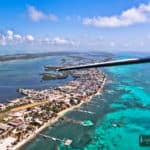
Belize has a rich history dating back to the ancient Maya. Initially called British Honduras, it was colonized by the United Kingdom in the 17th century and remained a British colony until 1981.
Although the country has faced many challenges such as disputes over land ownership between Spain and the UK, it has fostered a diverse and vibrant culture.
The Maya Civilization
As the first inhabitants of Belize, the ancient Maya civilization settled in the region around 1000 BC.
They built impressive cities and created a sophisticated society with a highly developed system of writing, art, mathematics, and astronomy.
Conquest and early colonial period
In the 16th century, the Spanish arrived in the region and claimed the area. However, the Maya fiercely resisted and the Spanish did not establish a strong presence in the area of what is now known as Belize.
The British, on the other hand, starting in the 17th century established several settlements around the exploitation of forestry resources such as logwood and then mahogany. Initially, the British brought African slaves to work in the logging industry but Indian indentured workers were eventually brought in when slavery was abolished.
As British settlements grew, the Spanish attacked several times, attempting to retain their land until the British ultimately defeated them in 1798 in what is known as the Battle of St. George’s Caye.
British Honduras
In 1862, the area was officially recognized as a crown colony of Britain and it was named British Honduras. St. George’s Caye and Belize Town, which is present-day Belize City, are examples of the first British settlements.
Forestry dominated the early economy of British Honduras. Logwood was first exploited, then mahogany, and later sapodilla, which was used for its gummy sap known as “chicle”. And when logging declined, the focus shifted to producing tropical products, such as sugar and bananas.
Self-governance and Independence
During the 1950s and 60s, British Honduras experienced an increase in political activism, accompanied by a strong push for liberation from British governance. This effort resulted in the attainment of “self-government” in 1964, ultimately culminating in full independence from the United Kingdom on September 21, 1981.
Signalling a break from its colonial past, the country was officially renamed Belize in June 1973. The name is believed to have Maya origins, stemming from the word “Balix,” which means “muddy water” in Mayan, a reference to the Belize River. The connection to the region’s indigenous history was intended to reflect the diverse heritage and identity of the nation.
Present-day Belize
Since its independence, Belize has faced several challenges, including high levels of poverty. However, it has seen economic growth and development in recent years, with a growing tourism industry focused on adventure ecotourism.
Today, the country is known for its diverse cultures, beautiful beaches, lush jungles, and rich biodiversity.



